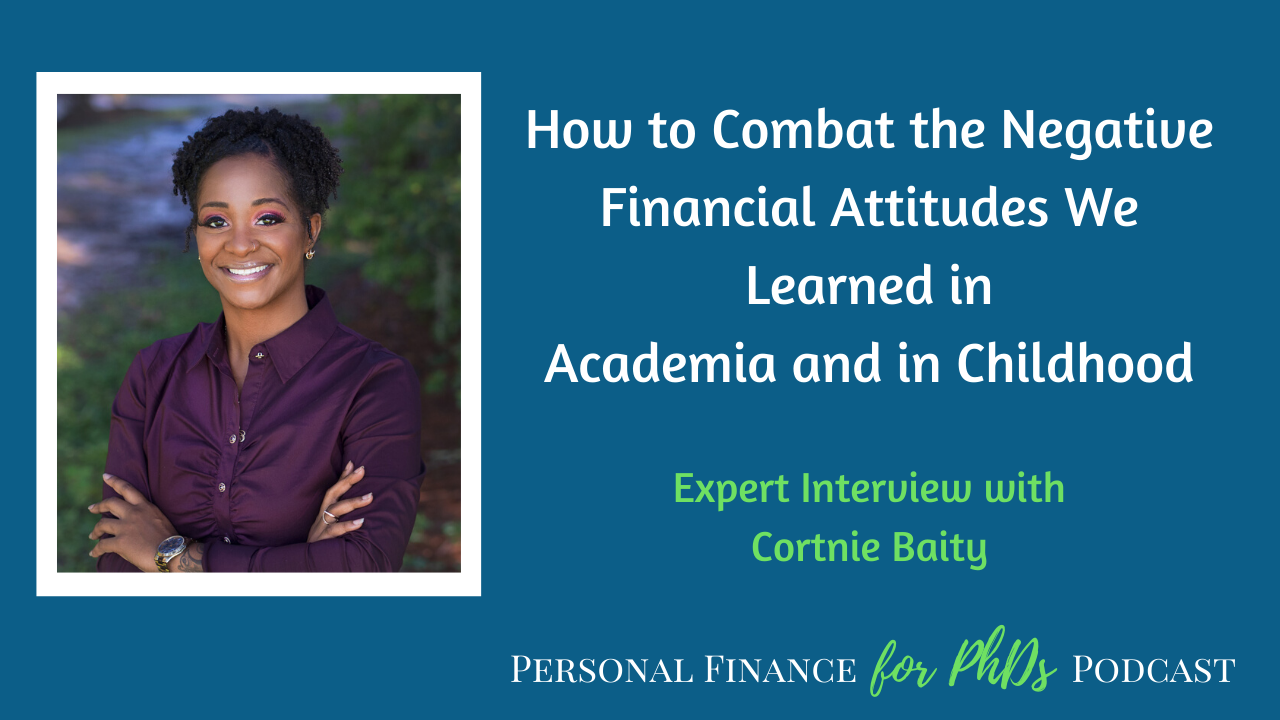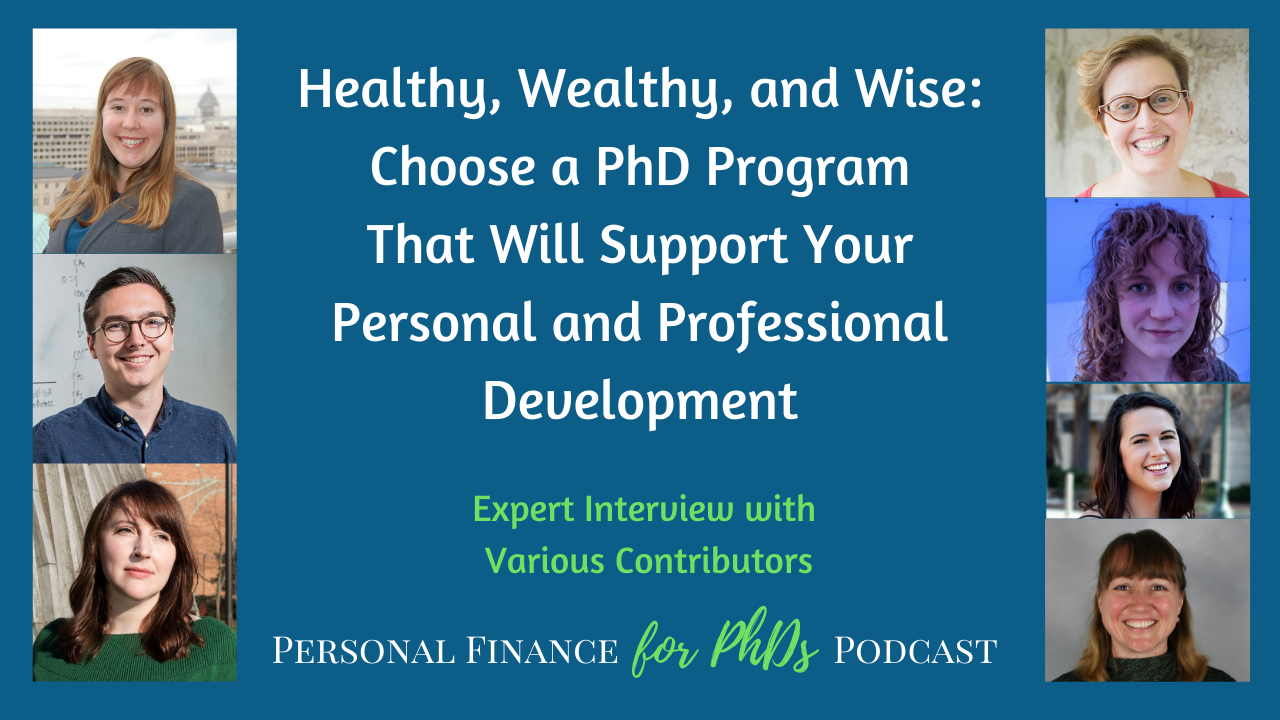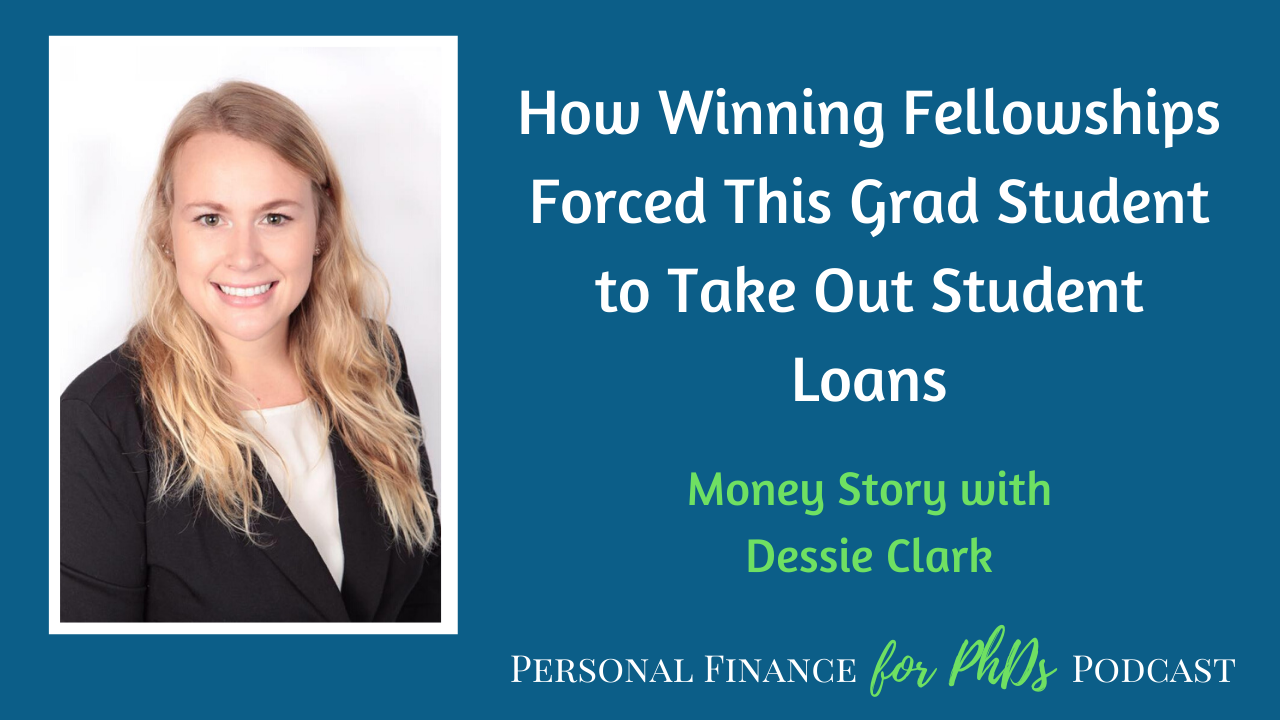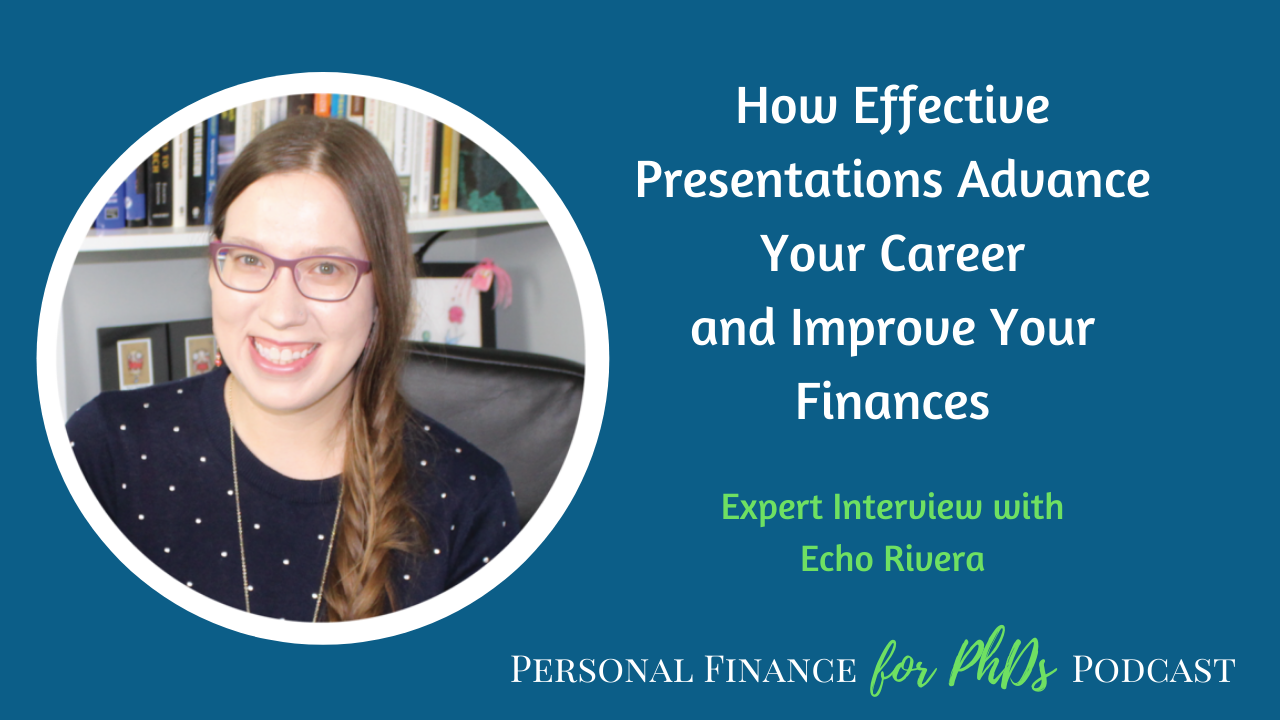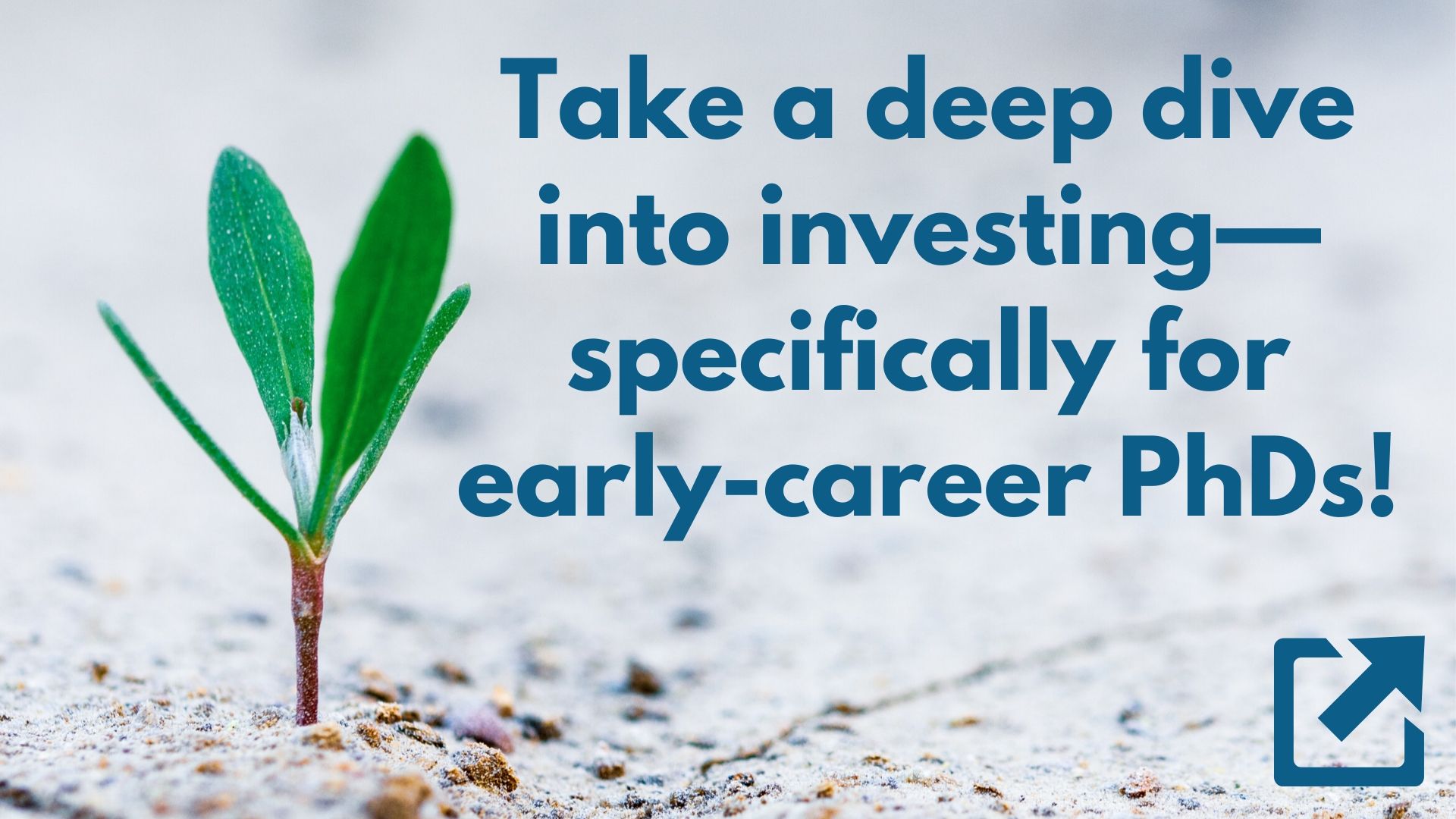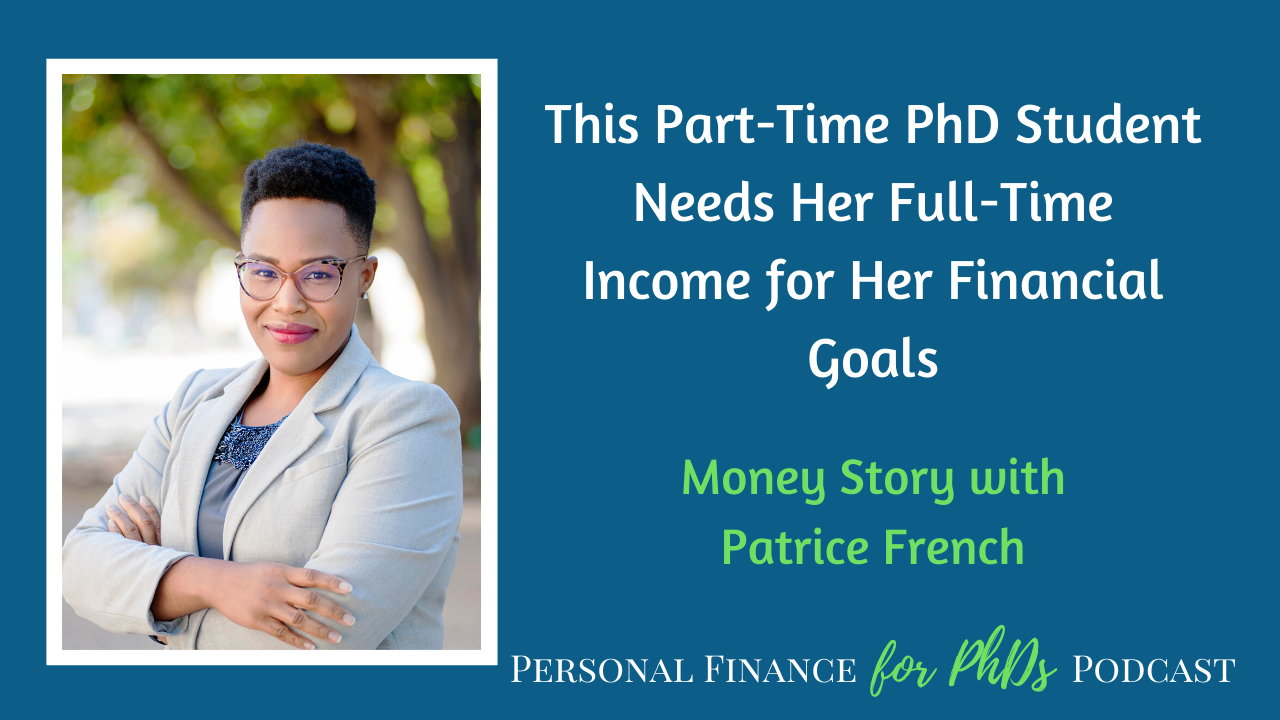In this episode, Emily interviews Cortnie Baity, a doctoral candidate in Human Development and Family Sciences at Florida State University and licensed marriage and family therapist intern. Cortnie’s dissertation is on how your upbringing influences your financial attitudes and behaviors later in life and how to effect better financial outcomes, specifically for African American families. Cortnie shares a framework from the literature of four money belief systems, three of which significantly correlate with income and net worth and two of which can become pathological. We discuss the financial messages PhDs absorb from academia and how those might influence financial attitudes and behavior. We conclude with Cortnie’s advice for PhDs who want to combat financial attitudes that don’t serve them well.
Links Mentioned in This Episode
- Find Cortnie Baity on Psychology Today or contact her via email
- Personal Finance for PhDs: Tax Hub
- Personal Finance for PhDs: Podcast Hub
- Personal Finance for PhDs: Subscribe to the mailing list
- Article: Money Beliefs and Financial Behaviors: Development of the Klontz Money Script Inventory
- The Money Script Inventory
Teaser
00:00 Cortnie: I would suggest early career PhDs to take a financial attitude questionnaire and to gain additional insight to see what financial attitudes you resonate with the most and how they could be possibly subconsciously guiding on your financial behaviors and influencing your overall financial well-being.
Introduction
00:25 Emily: Welcome to the Personal Finance for PhDs podcast, a higher education in personal finance. I’m your host, Dr. Emily Roberts. This is season five, episode three and today my expert guest is Cortnie Baity, a doctoral candidate in human development and family sciences at Florida State University and licensed marriage and family therapist intern. Cortnie’s dissertation is on how your upbringing influences your financial attitudes and behaviors later in life, and how to bring about better financial outcomes, specifically for African American families. We discuss how financial attitudes form and how they translate into behavior. Cortnie shares a framework from the literature of four money belief systems, two of which can become pathological. We discussed the financial messages PhDs absorbed from academia and how those might influence financial attitudes and behavior and what PhDs can do to combat financial attitudes that don’t serve them well. Without further ado, here’s my interview with Cortnie Baity.
Will Please Introduce Yourself Further?
01:25 Emily: I am delighted to have joining me on the podcast today Cortnie Baity, who is a doctoral student, and she specifically has an interest in financial attitudes and how they develop. This is such a relevant subject for us. I’m so delighted that Cortnie reached out to me and that we’ve been corresponding and she agreed to come on the podcast. So Courtnie, will you please introduce yourself?
01:47 Cortnie: Hello, Dr. Roberts and hello listening audience. Again, my name is Cortnie Baity. I am a current doctoral candidate in the human development and family sciences PhD program. I am located at Florida State University. I earned my masters of science degree from the couple and family therapy program at the University of Kentucky, where I initially became interested in personal finances. Just a little bit of background about my areas of research, it includes family finances, personal finances, socialization processes, African American families, and minority mental and physical health disparities. The overall goal of my research program is to minimize any inqualities in mental and physical health, experienced by black families. In the way that I have chosen to go about intervening on health for black families is looking at how personal finances influences or undergirds some of those health disparities that we might be noticing in the literature.
02:52 Emily: That is so interesting. So exciting. Really, really glad that you’re working in that area. Can describe for us for just a couple of minutes, the dissertation that you’re working on, your specific research?
03:04 Cortnie: Yes. So my dissertation studies financial socialization in black American families, and its implications on financial wellbeing for young black adults. My primary hypotheses is that black young black adults experience asset and resource inqualities, in part because they receive minimal or possibly counterproductive training about finances. My goal with my dissertation is to do three things: document diverse types of family, financial socialization experienced by black young adults, explore the consequences of types of family, financial socialization for financial literacy and financial wellbeing, and then lastly, consider gender variation experienced in family and financial socialization and how it may have undesired effects on financial literacy and financial wellbeing. My overall hope for this study is to, in this study and in following research, will be to produce clinical strategies for marriage and family therapists like myself to help black clients improve financial management, which can help reduce asset and resource inequalities among black families. Personal finance has been demonstrated in the literature to be connected to mental and health outcomes, especially unfavorable mental and physical health outcomes. So I’ve chosen to focus my research on personal finance interventions to improve black health overall.
What is Financial Socialization?
04:40 Emily: Yeah, I’m sure the listeners know that this is a subject that I’m intensely interested in — how to improve financial outcomes among our population, the PhD population. And this is so applicable. It’s a great subject for me to learn about as well. You’re using the term family financial socialization. Can you explain that? Can you define that a little bit more? What plays into that?
05:03 Cortnie: Yes. If we think about socialization broadly, there’s a communication component, so it’s the sending and receiving of a social message, but it also includes the implementation and application of that message into the individual’s life. If we put that into context of personal finance, we’re looking at how families socialize their members surrounding personal finances. That includes how the messages and beliefs surrounding personal finances, including budgeting, world perspectives about money, and the economy and that influences an individual’s financial attitudes. There’s also a tie between financial attitudes or your perspective of finances and how that influences your financial behaviors. And then of course your financial behaviors feed into your overall financial well-being.
06:03 Emily: Yeah. So there’s a whole chain there and this is something that is being passed from parents and other family members to children, and it’s being propagated within families, as well as within society more largely. Can you give some concrete examples of maybe those communications or demonstrated behaviors?
06:23 Cortnie: Sure. One concrete example of a family financial socialization that you may witness in families is, for instance, when families, parents will distribute out an allowance to a child, and they say, “Hey, you know, you have this amount of money once it’s gone, if you want to buy things for your hobbies or if you want to buy a video game, that money is gone.” And so it’s socializing the child surrounding finances in the family social context. Some type of message is being transmitted over to that child. The thought behind family financial socialization is that the child not only hears that message from the receiver, but they start to internalize that message and start to make decisions about their environment around them, based on the message from the receiver. And in that case, whether the child internalize the message to save the money and let it stretch a little bit. So don’t kinda spend all your money on the most expensive video game because you know that if you want to go to the movies the next weekend with your friends as well, you won’t have anymore financial means until the next time that you receive an allowance. So that will be one concrete example.
07:47 Emily: Yeah. Thank you for that. That’s definitely an example of an intentional or an overt way that parents would communicate around finances to their children. I don’t know about you, but the family that I grew up in, the signals around finances were implicit. We did not talk very openly about this subject, but I learned a lot from my parents by example. So can you give another example of how that kind of communication would work?
08:11 Cortnie: Oh yes, absolutely. Gudmunson and Danes has a family financial socialization theory and they support the idea that the majority of family financial socialization happens through modeling or observation. So one implicit way that we learn about money is when our parents will take us to the bank with them. There is some type of message that is being sent to us that there are outside institutions that help us to manage our money. That would be one concrete example of family financial socialization. You’re with your parent, it’s in the family social context is not really being spoken we’re at the bank because I need them to help me manage my money, but it’s that kind of unspoken undertone. It’s an institution It’s associated with money. I see mom and dad go here. So those kind of implied messages are occurring in that kind of way.
09:16 Emily: It’s a really, really interesting example. It just reminds me of, well first of all there’s a large unbanked population within the United States, right? So there’s all kinds of children who are not getting that particular kind of message that maybe some other children are. Maybe the actual interaction the parent is having with the teller or the manager could be positive, could be negative. All kinds of differences there. And it’s actually making me think now. So I have two very young children. The older one is maybe on the cusp of being able to learn some money lessons if we were to overtly teach something. But I’m just thinking about how much financial stuff that I do that it just takes place digitally online. It wouldn’t necessarily be seen very easily by my children if I just choose to not do that stuff in front of them. So yeah, I don’t know. Going into the new generation, we might have to have different strategies around how to do the socialization, given the differences.
10:09 Cortnie: Very true, very true.
The Four Financial Attitudes
10:11 Emily: Okay. So that’s about how parents and families are communicating some lessons around finances, implicitly or explicitly. How the children are receiving those attitudes. Can you speak a little bit more about the connection between what you’re learning in your family and the attitudes and so forth that you develop and then how that translates to behavior? What the connection is between those two.
10:33 Cortnie: Personal finance psychology and marriage and family therapist scholars, Klontz and Britt have produced some studies that look at how financial attitudes developed and they suggest that trans-generational personal finance messages, typically learned in childhood, subconsciously influences the development of financial values and beliefs. And collectively these financial values and beliefs are referred to as financial attitudes. So Klontz and Britts specifically have come up with four distinct financial attitudes. One is money avoidance, money worship, money status and also money vigilance. To have these categories are important because some of them suggest a pathologic view of money that can have a negative impact on your financial behaviors in your overall financial well-being.
11:35 Emily: I love to hear a framework. This is great. Can you say a couple of words about what each of those four categories are so people can kind of say, “Oh, I definitely see myself here or there.”
Money Avoidance
11:45 Cortnie: Reiterating when I say a financial attitudes are important because certain attitudes for example, like money avoidance and money worship, have been demonstrated to suggest pathological views of money. Those who resonate with money avoidance attitudes may tend to believe that money is bad or that you don’t deserve money, and for people with this personality, money can typically evoke feelings of fear, anxiety, or disgust even. This is a financial attitude that is common among low income, younger, and single individuals because they typically have something going on with them where money is evoking these anxiety or stressor indicators for them. It has been demonstrated that typically those who are money avoidant produce, financial outcomes like financial well-being that are not as high as individuals who possibly resonate more with other types of financial attitudes.
12:58 Emily: Yeah, I definitely can see that. I mean, we can sort of imagine very easily that prototype person who is money avoidant. There’s probably, I don’t know if they’d be listening to the podcast, but there’s certainly potentially some of those within academia, within graduate students. Maybe not because of how they were raised, but then the environment that they’ve been put in, you know, since getting into training. We’ll talk more about that a bit later, but go through these other three categories please.
Money Worship
13:23 Cortnie: Money worship, more so those types of individuals, you would see indicators of that individual where they’re very central to their career. They’re very central to building wealth and things like that. It can be suggestively pathological. In the Klontz Money Scripts inventory, there is a cutoff score for what is kind of considered as like a clinical concern, a clinical cutoff score. If you go beyond that threshold, you will be considered possibly you need to look into it being an actual issue. Even if you resonate with, and I do want to say it is possible for you to resonate with several categories of financial attitudes. For a lot of people it kind of depends on the context. Like we talked about, being a PhD student. But going back to what I was saying with the, clinical cutoff score, there essentially are four different types of financial attitudes and worship would be another example of that. There’s literature that goes through the exact representations of the four financial attitudes and Klontz and Britt will be the scholars to kind of refer to that information in further detail.
15:05 Emily: Yeah, I would love it if you could send me a link to put in the show notes for that. Yeah. So I think money worship is another one where we can again, sort of maybe imagine a prototype for that. And I think that I, obviously I don’t know about this clinically for myself, but I have been very careful, mentally to not, because I think I have maybe some tendencies where I could fall into that category. Maybe not even tendencies, but just based on what I do, right? I talk a lot about money. I’m very careful to not allow myself to fall into that category.
Money Status and Money Vigilance
15:33 Emily: Can you remind me what the final two were and maybe give some examples? These were maybe more the non pathological categories.
15:41 Cortnie: Money status, it more so resonates with viewing money as a social status for yourself. And then also money vigilance is being careful with money. Those are two that are not as suggestive to pathological views of money.
16:02 Emily: Yeah. Okay. Thanks for that clarification. I’m seeing myself maybe in the vigilance category, for sure, and I hope the audience is starting to get an idea of where they might fall and what possible interventions might be helpful depending on where they are.
Commercial
16:21 Emily: Emily here for a brief interlude. Tax season is upon us and while no one loves this time of year, it’s particularly difficult for post-bac fellows, funded grad students, and postdoc fellows. Even professional tax preparers are often thrown for a loop by our unique tax situation. And don’t get me started on tax software. I provide tons of support at this time of year for PhD trainees preparing their tax returns. From free articles and videos, to paid at-your-own-pace workshops, to live seminars and webinars for universities and research institutes. The best place to go to check out all of this material is pfforphds.com/tax that’s P F F O R P H D dot com slash T A X. Don’t struggle through tax season on your own. Visit my website for the exact information you need in the most efficient form available. Now back to the interview.
How Financial Attitudes Can Affect Your Finances
17:25 Emily: Can you give maybe like a concrete example of how let’s say, a money avoidant person, a behavior that might result from that attitude?
17:33 Cortnie: I think that it kind of blends into our follow-up question of how does academia, how does being a graduate student, how does that influence certain financial attitudes. As we all know, being a graduate student is very expensive, yet graduate students often have very little income, unless you’re in a situation where you do have enough fellowships and scholarship funding to carry you throughout your entire program. Also, because graduate students are in the process of becoming experts in their field, they may feel like they do not deserve to get paid very much. Those kinds of experiences typically evoke fear and anxiety surrounding money, which could be suggestive that graduate students tend to have a money avoidant financial attitude. Of course, there are clinical cutoffs for that, as we discussed before, but some of those common experiences and feelings of being a graduate student, surrounding money, may lead to being category categorized as money avoidant.
18:52 Emily: Yeah, I definitely want to talk about for this for another moment, because I think this is going to be such a common experience for many people in our audience. Either that they’re currently in this space, they are currently a graduate student and experiencing some of these forces and attitudes or maybe that is in their past and it’s still something they’re working on because they still have some residual effect, mentally, from that time. I do think there are pervasive messages within academia that your passion should sustain you. You should not care how much money you’re making right now or in the future because you just love your work so much, none of the rest of that matters. It really plays into a larger attitude within academia. And I’m not blaming any person or institution. This is just like a mother culture kind of thing around “Well, you should just go ahead and put your life on hold while you’re in training. Nothing else matters aside from your training. Put your money on hold, put your relationships on hold. Other things in your personal life, your health, mental health, all that stuff is secondary to the all consuming goal of your research getting to a certain level, finishing your dissertation, whatever it is. Super, super unhealthy. Super, super unsustainable. I mean, maybe you can do that for a few months or a year, but for the five, ten, more years you might be in training it’s too tall of an order. And yet this is still the message that we’re all kind of marinating in within academia. Right? And so what I think I’m hearing from you is that these messages, maybe it’s not the family that we grew up in, right? That has a certain influence on us. But then our academic family is also having an influence. Does that make sense? Can you talk a little bit more about that?
20:37 Cortnie: That definitely makes sense because essentially what family financial socialization theory suggests is that our founding beliefs and values surrounding money typically come from the family system because that’s typically our first opportunity to learn in a social context. As you become 18 and you move away from home and you have more interactions with other socialization agents, like being in an academic setting, being around peers, being in a romantic relationship, that influences your personal finances as well, or how you’re being socialized around personal finances as well. It’s certainly a undertone, kind of an unspoken thing in academia that the main goal is to focus on getting your program or research to a certain level, getting through the program and graduating and the personal finance piece is often not really addressed very much, or the stressors that are associated with finances are typically not addressed unless you actually go directly to a personal finance specialist on campus that can help you to continue to fund your program. And not just your program, but your life outside of that. A lot of graduate students have full blown families. They’re married, they have mortgages and all kinds of things like that. So yes, academia can definitely put some stressors on your personal finances and your financial beliefs and kind of make you question “Should I be money avoidant because it gives me so much anxiety or possibly having the opposite effect of making you so money vigilant to the fact that you kind of become OCD about just budgeting down to the dime every single semester so that you can have all your expenses covered.
22:43 Emily: Yeah I think there’s the component of what we sort of implicitly absorb in academia about work being the primary thing. But then there’s what you were just saying, the actual real life in your face stressors – the stressors associated with being academia, not being paid enough for where you’re living, having to pay tuition fees, the budgeting issues. These are all not just in your mind, these are real problems that are happening to students. And I think what I’d also love you to comment about is the influence that these experiences and hearing these messages can have on a young adult, right? We’re just talking about okay, the family is the first place where we start to form these attitudes. But I would imagine that a graduate student in their 20,s maybe straight through college and to graduate school is going to have a different set of experiences than someone who starts later on after working. Maybe they are married, maybe they’ve had just more time to build up what their beliefs are and their attitudes around their own finances. Can you comment about that a little bit?
23:46 Cortnie: So I’m not speaking from my empirical research theoretical standpoint. This is just my own personal perspective. But my belief is that when young adults go straight through graduate school and they don’t really get that real world application personal finance management, they kind of start at a deficit when it comes to personal finances as an early career PhD, or if you’re graduating fresh out of a master’s program or early career master’s degree recipient. You don’t have those opportunities to really grapple and absorb what it means to budget with an income and a salary, especially not at the level that you will be earning outside of a graduate program. Then also maybe not being privy to the realities of the consequences of not having enough personal finance related literacy. Not knowing about how credit works, how student loans may impact credit, how that may later impact your purchasing power when it comes to purchasing a new home or a car. And then of course, it has implications on your romantic relationship. Having to have not so easy conversations with your partner that “Hey, you know, when it comes to my personal finances, I’m kind of behind the curve”, especially if you have a partner who did not take the graduate school route, who did have opportunities to kind of build up their financial literacy through work experiences and budgeting that adults do who do not decide to go straight through graduate school. So yes, absolutely, going to graduate school for us to sit significant amount of years, not participating in the workforce as like a traditional adult would so to speak, definitely can leave a graduate school student at a little bit of a deficit when it comes to managing their personal finances. Unless you’re a business major, typically you do not get that background working knowledge about personal finance management.
How to Work with the Money Attitudes You Have
26:11 Emily: Yeah. This is exactly the space that I’m trying to step into. On that subject, once a person recognizes, “okay, academia is feeding me some toxic messages, it’s giving me all these stressors,” what do you do with that? How is it that you can change financial attitudes. Or maybe it’s from the upbringing as well. Maybe you recognize, “okay, my family was not super healthy around this, can I change my own way I approach these things?” How do you actually do that?
26:39 Cortnie: Me, personally, as I’ve gone throughout my graduate school education, I have become more immersed in the subject area of personal finances, becoming more aware of my own financial attitudes and financial behaviors that do not serve me well, and I go by the saying of try to practice what I preach in my clinical practice. And as a therapist, I suggest to all my clients, the first step of changing an unwanted behavior is to acknowledge that it’s problematic and explore its origins. If you recognize that you’re just taking out way too many loans, it’s just not feeling right to you, kind of explore the fact you’re going against what one of your financial values or beliefs are, which is to keep your loans to a minimum, and explore where the origin of the motivation to do that behavior is coming from. Once you have acknowledged that the behavior is problematic, explored its origins, from there I will suggest seeking out resources to support the desired behavior change. Personally what I did for myself is one, I made personal finances, I was very intentional incorporating that in my area of research. And also, my niche is actually surrounding personal finances, mental health, physical health and family relationships. And so it kind of forced me to get immersed in the personal financial literature, become more financially literate in ways that were supportive of my career, but also in my personal life. So I actually did the accredited financial counseling education requirement through Texas Tech University. I did that program back in this past spring and I learned a wealth about personal finances that not only legitimized myself as a marriage and family therapist, that her niche would be personal finances, but also my research. I will say another huge impact that it had was application into my own personal finances. Recognizing that there’s an issue with the financial attitude or the behaviors that you have become accustomed to in graduate school, exploring what the origins are, like why did you even start doing these behaviors, and then seeking out resources, and there’s a wide variety of ways of doing that, but just becoming more knowledgeable about healthy money management.
29:44 Emily: I can definitely see a parallel in myself to what you’re saying. I didn’t necessarily know that what I was trying to do was changing my attitude so that my behaviors would follow. But I can see, from my upbringing, I grew up with a one one parent who was like a spender and one who was like a saver, and sort of absorbed the spender mindset from one of my parents. And that was something when I finally had my own paycheck coming in, I realized my small stipend cannot support the spender inclinations that I had based on my upbringing. And so that was something that I had to, as you were just saying, recognize, “okay, this is going to put me at some dissonance here.” This desired behavior and the financial realities, I realize, “Okay, well that I learned that from my parent. That doesn’t have to be what I do. That’s just what my parent behaves that way, I can be different.” And as you just said, seeking out more and more resources and support around the positive behavior that I wanted to affect, which was not spending a lot of money whenever I wantet to. And so the resources that I went to at that time were personal finance books, the personal finance blogosphere, which now has morphed into podcasts and blogs and Reddit and all these other wonderful places where you can go for resources. So I really sort of started to see into the lives of people who I could recognize as models of positive financial behaviors and start to, um, enact what they were doing in my own life. And if I would be so bold, I will say that the Personal Finance or PhDs community is one of these places where you can learn some of these positve behaviors, from me and from the guests who I interview and from the articles I have on the site and there’s lots of ways you can get involved. In fact, please, if you’re not yet on my mailing list, get on my mailing list because I’ll be sending this great content your way every week.
31:35 Emily: Cortnie, thanks so much for pointing that out. I think we’re coming to the end of the interview here. If someone wants to follow up with you, maybe they have a question about something you’ve said today or maybe they’re like, “Oh my gosh, I need Cortnie in my life. I need more Cortnie”, how can they get in touch with you?
31:51 Cortnie: For those listeners out there who are interested, I’m always happy to share whatever information I have and chat with you. So, um, I can be best contacted at my email. It’s [email protected]. I am also listed on the Psychology Today website as a psychology today verified marriage and family therapist intern. You can look their website up and then as we’ve discussed previous to actually starting the interview, you’ll leave the actual website in the notes. Then also the agency that I’m currently contracted it as a marriage and family therapist intern, Better Living Solutions in Tallahassee, Florida, and we’ll also leave information for their direct website. Those are two additional mediums to gain contact with me.
32:57 Emily: Yeah, it’s so excellent. All that information will be in the show notes as Cortnie just said.
Final Words of Advice
33:00 Emily: So last question here, Cortnie, what is your best financial advice for another early career PhD?
33:07 Cortnie: In the same spirit of the conversation we’ve been having, I would suggest early career PhDs to take a financial attitude questionnaire — one example is the Klontz money script inventory — and to gain additional insight. If you have some inklings but you’re not exactly sure if you’re at that clinical cutoff for certain financial attitudes, to see what financial attitudes you resonate with the most and how they could be possibly subconsciously guiding on your financial behaviors and influencing your overall financial well-being.
33:47 Emily: Perfect. And can we add that link to the show notes as well?
33:49 Cortnie: Absolutely.
33:50 Emily: All right. Perfect. Oh, Cortnie, this is such a wonderful interview. Thank you so much for providing your expertise on this subject.
33:56 Cortnie: Thank you so much for having me Dr. Roberts, I enjoyed talking with you.
Outtro
34:01 Emily: Listeners, thank you for joining me for this episode. PFforPphDs.com/podcast is the hub for the Personal Finance for PhDs podcast. There, you can find links to all the episode show notes and a form to volunteer to be interviewed. I’d love for you to check it out and get more involved. If you’ve been enjoying the podcast, here are four ways you can help it grow. One, subscribe to the podcast and rate and review it on Apple podcast, Stitcher, or whatever platform you use. Two, share an episode you found particularly valuable on social media or with your PhD peers. Three, recommend me as a speaker to your university or association. My seminars covered the personal finance topics PhDs are most interested in, like investing, debt repayment, and taxes. Four, subscribe to my mailing list at PFforPhDs.com/subscribe. Through that list, you’ll keep up with all the new content and special opportunities for Personal Finance for PhDs. See you in the next episode, and remember, you don’t have to have a PhD to succeed with personal finance, but it helps. The music is Stages of Awakening by Podington Bear from the Free Music Archive and is shared under CC by NC. Podcast editing and show notes creation by Lourdes Bobbio.
